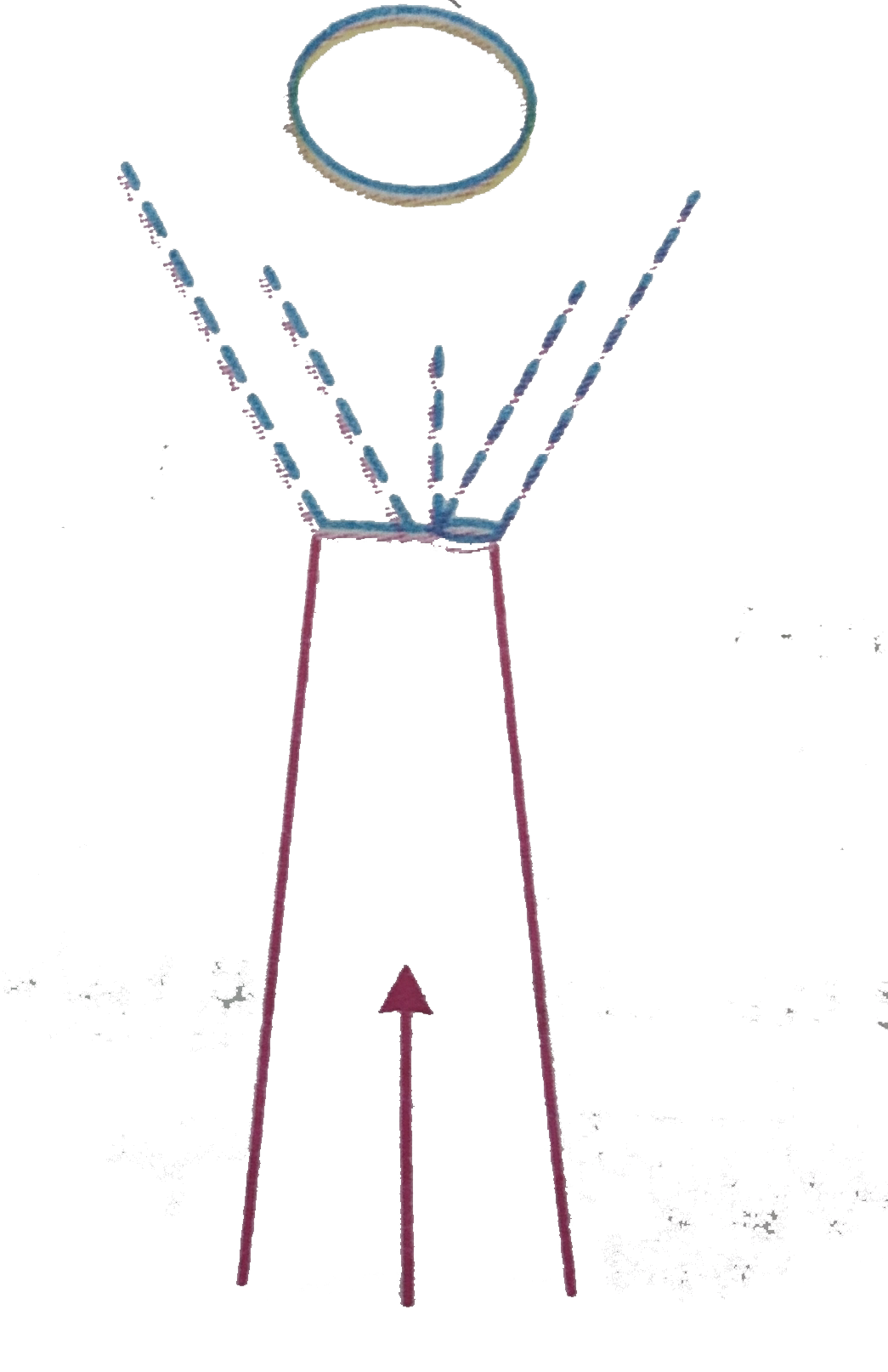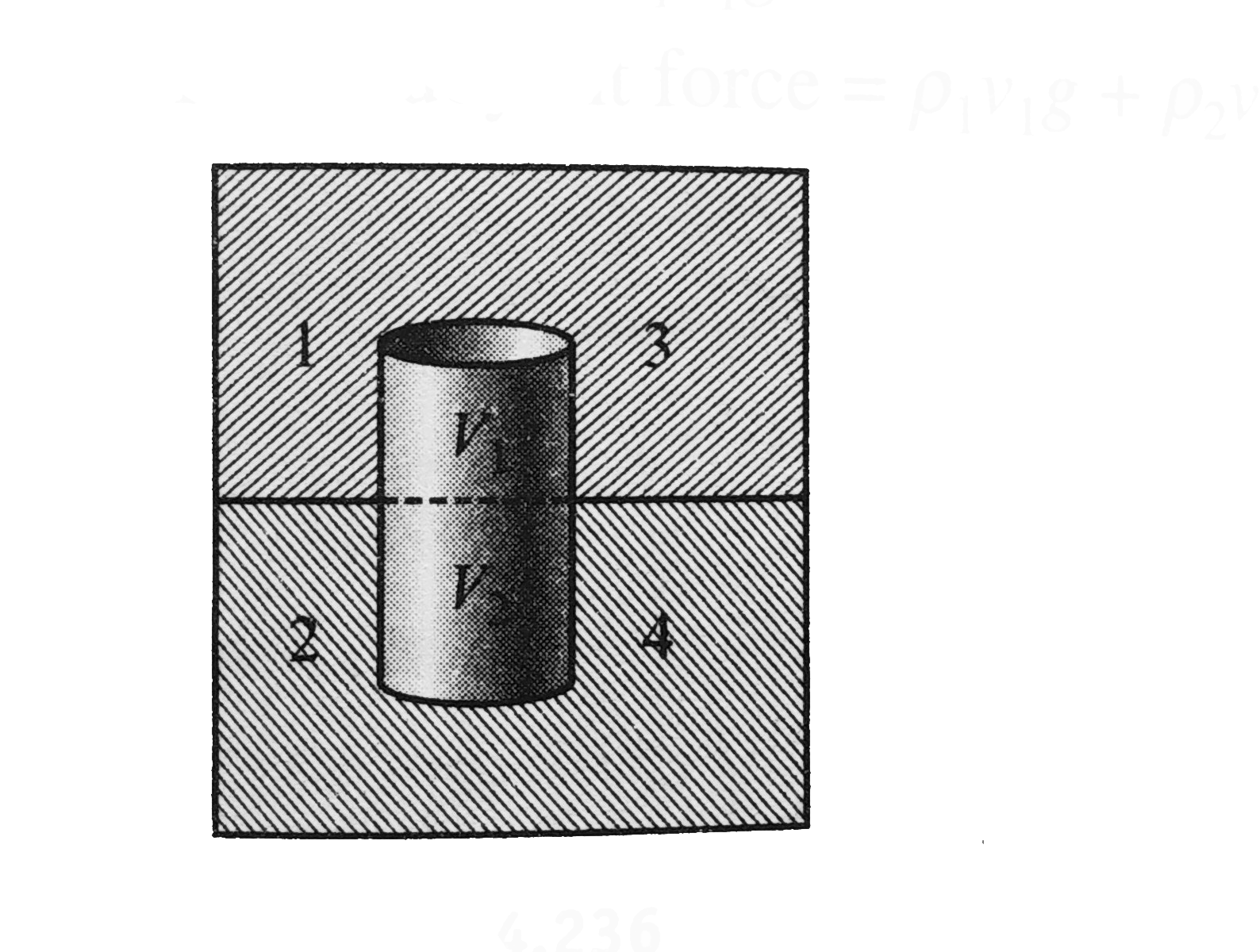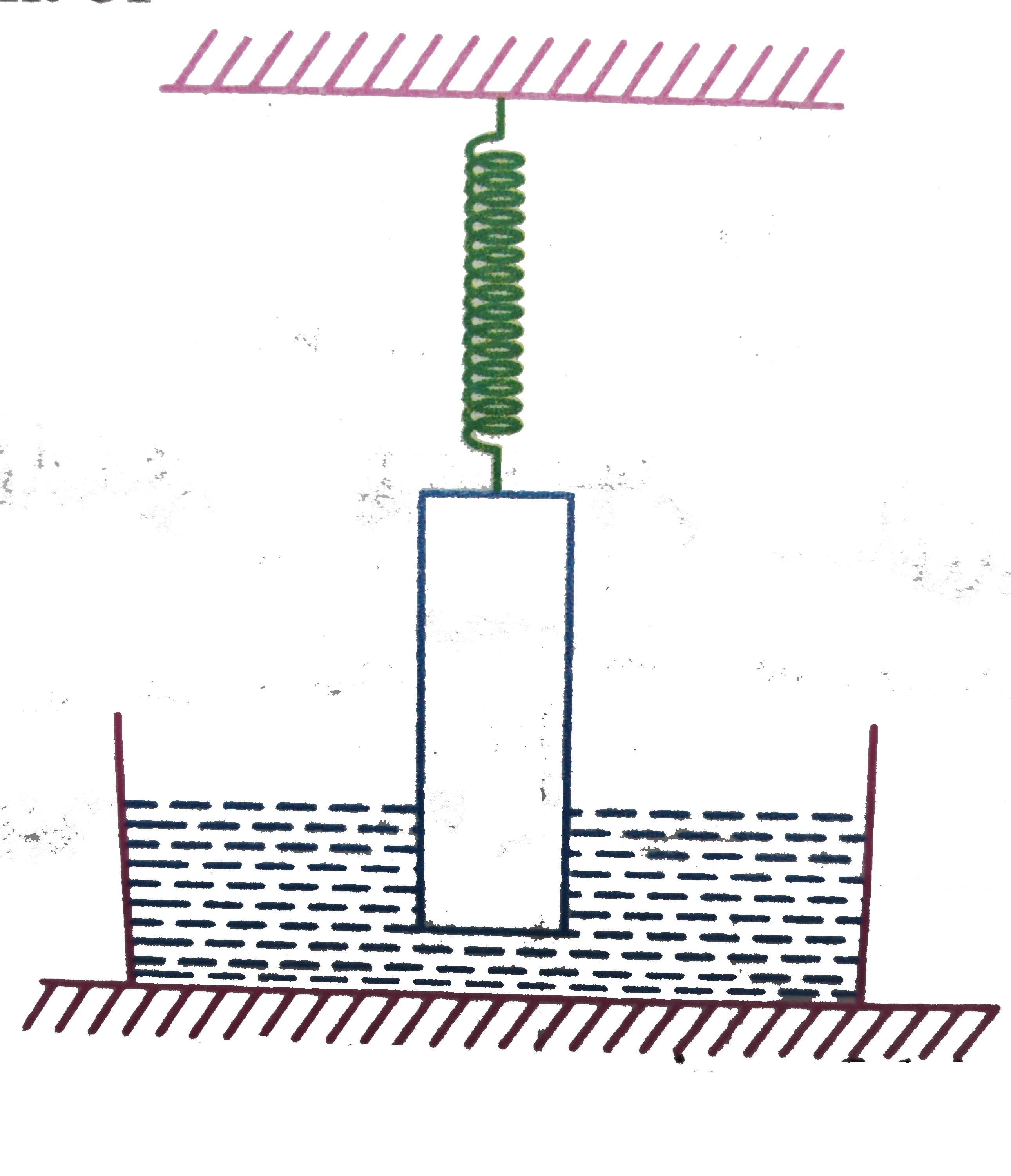Complete Solutions to Statement Type Questions of chapter MECHANICAL PROPERTIES OF FLUIDS of Class 11 book with complete answers and questions
| Class 11 | PHYSICS |
| Chapter | MECHANICAL PROPERTIES OF FLUIDS |
| NARAYANA | Statement Type Questions |
| Number Of Questions | 16 |
| Academic Year | 2023-24 |
Statement-1: A light celluloid ball placed in a stream of gas or water issuing at a high velocity from a tube with a narrow neck, the ball floats freely however in this stream (fig)

Statement-2: The gas is the stream has a high velocity, the pressure inside the stream is above atmospheric.
View SolutionStatement I: When a body floats such that its parts are immersed into two immiscible liquids, then force exerted by liquid `1` is of magnitude `rho_(1)v_(1)g`.
Statement II: Total buoyant force `=rho_(1)v_(1)g+rho_(2)v_(2)g`.

View Solutionstatement 1 is false, statement 2 is true.
Statement-1: When a soda water bottle fals freely from a height `h`, the gas bubble rises in water from the bottom.
Statement-2:Air lighter than liquid.
View Solutionstatement 1 is false, statement 2 is true.
Statement-1: A soft plastic bag weights the same when empty or when filled with air and measured in vacuum.
Statement-2: The same results will be observed when measured in air.
View SolutionStatement 1 is false, statement 2 is true.
Statement-1: The speed of liquid coming out of the orifice is independent of the nature and quality of liquid in the container.
View SolutionStatement 1 : If P is the pressure of gas inside the exhaust chamber of a rocket and `P_(0)` is the pressure of the gas outside the chamber. The forward thrust on the rocket is `2a (P- P_(0))` insteady of a `(P-P_(0))` where a is the area of orifice.
Statement -2: The formula thrust `= a(P - P_(0))` holds good for fluids at rest. In the case of rocket the flurids are in motion and we have to use Bernoulli's principle for calculating the thrust.
View SolutionStatement -1: A smooth block of mass `2kg` and specific gravity `2.5` is attached with a spring of force constant `k = 100 N//m` and is half dipped in water. If the extension in the spring is 1cm, the force exteted by the bottom of tank on the block is `19N`.
Statement-2 : In the arrangement shown, the buoyant force acting on the block is equal to weight of liquid displaced.

View SolutionStatement-1 A boy carrying a fish in one hand a bucket full of water in the other hand, places the fish in the bucket. He now carries comparatively lesser weight as the weight of the fish will be reduced due to upthrust.
Statement -2: The boy will carry still the same weight.
View SolutionStatement-1 : For rotational equilibrium of floating bodies, meta centre must always be lower than centre of gravity of the body
Statement-2 : When a floating body is slightly tilted from equilibrium , centre of buoyance shifts. The vertical line passing through new centre of buoyance and initial vertical line meet at a point, which is called meta centre.
View SolutionStatement I: Smaller drops of liquid resist deforming forces better than the larger drops.
Statement II: Excess pressure inside a drop is directly proportional to its surface area.
View SolutionStatement I: A needle placed carefully on the surface of water may float, whereas the ball of the same material will always sink.
Statement II: The buoyancy of an object depends both on the material and shape of the object.
View SolutionStatement I: Droplets of liquid are usually more spherical in shape than large drops of the same liquid.
Statement II: Force of surface tension predominates force of gravity in case of small drops.
View SolutionStatement I: Spraying of water causes cooling.
Statement II: For an isolated system, surface energy increase on the expense of internal energy.
View SolutionStatement I: Finer the capillary, greater is the height to which the liquid rises in the tube
Statement II: This is in accordance with the ascent formula.
View SolutionStatement I: A needle placed carefully on the surface of water may float, whereas the ball of the same material will always sink.
Statement II: The buoyancy of an object depends both on the material and shape of the object.
View SolutionStatement I: As radius of soap bubble increases, the insude pressure increases.
Statement II: Excess pressure in soap bubble is inversely propotional to radius.
View Solution
Statement Type Questions questions and complete solutions for chapter MECHANICAL PROPERTIES OF FLUIDS of NARAYANA PHYSICS (HINGLISH) of Class 11
All Exercises from NARAYANA Class 11 PHYSICS MECHANICAL PROPERTIES OF FLUIDS
- C.U.Q
- C.U.Q (EQUATION OF CONTINUITY, BERNOULLI.S THEOREM)
- C.U.Q (TORRICELLI.S THEOREM AND VISCOSITY)
- C.U.Q(POISEUILLE.S EQUATION)
- C.U.Q(PRESSURE, FORCE OF BUOYANCY, LAWS OF FLOATATION)
- Comprehension Type Questions
- EVALUATE YOURSELF - 1
- EVALUATE YOURSELF - 10
- EVALUATE YOURSELF - 11
- EVALUATE YOURSELF - 12
- EVALUATE YOURSELF - 2
- EVALUATE YOURSELF - 3
- EVALUATE YOURSELF - 4
- EVALUATE YOURSELF - 5
- EVALUATE YOURSELF - 6
- EVALUATE YOURSELF - 7
- EVALUATE YOURSELF - 8
- EVALUATE YOURSELF - 9
- Examples
- EXERCISE - I - (C.W) (CAPILLARITY & CAPILLARY RISE)
- EXERCISE - I - (C.W) (COEFFICIENTY OF VISCOSITY & VISCOUS FORCE)
- EXERCISE - I - (C.W) (COMBINATION OF DROPS & BUBBLES)
- EXERCISE - I - (C.W) (EQUATION OF CONTINUITY, BERNOULLI.S THEOREM AND APPLICATIONS)
- EXERCISE - I - (C.W) (EXCESS PRESSURE INSIDE A LIQUID DROP AND SOAP BUBBLE)
- EXERCISE - I - (C.W) (FORCE DUE TO SURFACE TENSION)
- EXERCISE - I - (C.W) (POISEUILLE.S EQUATION)
- EXERCISE - I - (C.W) (PRESSURE AND PASCAL.S LAW)
- EXERCISE - I - (C.W) (TERMINAL VELOCITY & VISCOUS FORCE)
- EXERCISE - I - (C.W) (TORRICELLI.S THEOREM)
- EXERCISE - I - (H.W) (CAPILLARITY & CAPILLARY RISE)
- EXERCISE - I - (H.W) (COEFFICIENT OF VISCOSITY & VISCOUS FORCE)
- EXERCISE - I - (H.W) (COMBINATION OF DROPS & BUBBLES)
- EXERCISE - I - (H.W) (EQUATION OF CONTINUITY, BERNOULLI.S THEOREM AND ITS APPLICATIONS)
- EXERCISE - I - (H.W) (EXCESS PRESSURE INSIDE A LIQUID DROP AND SOAP BUBBLE)
- EXERCISE - I - (H.W) (FORCE DUE TO SURFACE TENSION)
- EXERCISE - I - (H.W) (POISEUILLE.S EQUATION)
- EXERCISE - I - (H.W) (PRESSURE AND PASCAL.S LAW)
- EXERCISE - I - (H.W) (REYNOLDS NUMBER)
- EXERCISE - I - (H.W) (TERMINAL VELOCITY)
- EXERCISE - I - (H.W) (TORRICELLI.S THEOREM)
- EXERCISE - I - (H.W) (VARIATION OF PRESSURE, UPTHRUST)
- EXERCISE - I - (H.W) (WORK & SURFACE ENERGY)
- EXERCISE - II (C.W) (CAPILLARITY & CAPILLARY RISE)
- EXERCISE - II (C.W) (EQUATION OF CONTINUITY, BERNOULLI.S THEOREM AND ITS APPLICATIONS)
- EXERCISE - II (C.W) (EXCESS PRESSURE INSIDE A LIQUID DROP AND IN A SOAP BUBBLE)
- EXERCISE - II (C.W) (FORCE DUE TO SURFACE TENSION)
- EXERCISE - II (C.W) (POISEUILLE.S EQUATION)
- EXERCISE - II (C.W) (PRESSURE AND PASCAL.S LAW)
- EXERCISE - II (C.W) (TERMINAL VELOCITY)
- EXERCISE - II (C.W) (TORRICELLI.S THEOREM)
- EXERCISE - II (C.W) (VARIATION OF PRESSURE, UPTHRUST)
- EXERCISE - II (C.W) (WORK & SURFACE ENERGY)
- EXERCISE - II (H.W) (CAPILLARITY AND CAPILLARY RISE)
- EXERCISE - II (H.W) (EQUATION OF CONTINUITY, BERNOULLI.S THEOREM AND ITS APPLICATIONS)
- EXERCISE - II (H.W) (EXCESS PRESSURE IN A LIQUID DROP AND IN A SOAP BUBBLE
- EXERCISE - II (H.W) (POISEUILLE.S EQUATION)
- EXERCISE - II (H.W) (PORCE DUE TO SURFACE TENSION)
- EXERCISE - II (H.W) (TORRICELLI.S THEOREM)
- EXERCISE - II (H.W) (VARIATION OF PRESSURE AND UPTHRUST)
- EXERCISE - II (H.W) (WORK & SURFACE ENERGY)
- EXERCISE - III
- Illustration
- Level 1 (C.W)
- Level 1 (H.W)
- Level 2 (C.W)
- Level 2 (H.W)
- Level 3
- More Than One Alternative Type Question
- Paragraph Type Questions
- Single Answer Questions
- Statement Type Questions